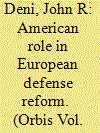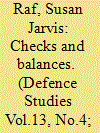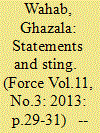|
|
|
Sort Order |
|
|
|
Items / Page
|
|
|
|
|
|
|
| Srl | Item |
| 1 |
ID:
118301


|
|
|
|
|
| Publication |
2012.
|
| Summary/Abstract |
In order to influence the direction and outcomes of defense reforms occurring across Europe, the United States needs to refocus its military-to-military engagement programs with its European allies. Instead of seeking to build partner capacity among the newest NATO members or aspirants, Washington will be better served by maintaining and strengthening interoperability with those allies that are adaptive and innovative, deployable and expeditionary, and capable of full spectrum operations-that is, allies such as France, Italy, Germany, the Netherlands and the United Kingdom. This finding is based upon what Washington itself sees as the future of conflict and the kinds of coalition partner skills and abilities the United States will need to counter post-International Security Assistance Force International Security Assistance Force (ISAF) threats to U.S. and collective security. Given budget and force structure cuts facing the United States as well, the American military cannot afford to waste its limited security cooperation resources.
|
|
|
|
|
|
|
|
|
|
|
|
|
|
|
|
| 2 |
ID:
128241


|
|
|
|
|
| Publication |
2013.
|
| Summary/Abstract |
On 30 November 2000 the UK Government enacted legislation leading to the formalisation of freedom of official government information (within specified bounds) for the UK voting public. The Freedom Information Act (FOI Act), although passed into law in 2000, did not come into full effect in the UK until January 2005. In order to 'police' the Act, the Information Commissioner's Organisation (ICO) was set up. The ICO is responsible for monitoring the performance of 43 government bodies1 against performance requirements under the FOI Act 2000. This includes a deadline for responding to initial Requests for Information (RFIs) of 20 working-days. The ICO also handles any unresolved2 complaints or disputes concerning non-disclosure or late release of information requested under an RFI.
To head the ICO, the new post of Information Commissioner was created in January 2001, subsuming the previous role of the Data Protection Registrar.3 The incumbent works within the bureaucracy of the Ministry of Justice (MOJ), reporting directly to Parliament in order to remain politically independent.4 The powers of the Information Commissioner include the use of various levels of sanction. These include formal legal action against government bodies that fail to comply with the provisions of the FOI Act 2000 and other related information legislation.5 Every quarter, and annually, the UK Statistics Authority, on behalf of the ICO and the MOJ, reports on the performance of all 43 monitored government bodies against the requirements of the FOI Act 2000.
|
|
|
|
|
|
|
|
|
|
|
|
|
|
|
|
| 3 |
ID:
124690


|
|
|
|
|
| Publication |
2013.
|
| Summary/Abstract |
That as a nation we are obsessed with ground-based tactics was in ample evidence at the annual press conference of the chief of air staff (CAS) Air Chief Marshal NAK Browne. A week before the 81st Indian Air Force day celebrations, the CAS and his staff had probably burnt the midnight oil to take on some hard-hitting questions from the media on the receding possibility of signing the ambitious Rafale fighter deal; depleting force levels; poor state of Indian Air Force (IAF) ground infrastructure, especially in remote border areas; allegations of nepotism on certain contracts and corruption on others; slow pace of modernisation of air defence assets; IAF's obstinacy on reforms in higher defence management; and inadequacy of ideas on creating a cogent deterrence for the threat from the east. Not once during their midnight confabulations would they have imagined, that all these efforts would come to a nought.
Because very few in the assembled gathering of the journalists wanted to ask the air force chief any question on the air force. Everyone wanted to know - repeatedly, question after question, in various combinations and permutations - about Indian Army's counter-infiltration (CI) operation in the Keran sector of north-west Kashmir. Kindled by exaggerations and fanned by rumours, the so-called CI operation in the thick forests of Keran was likened to the occupation of the Indian Army posts in the Kargil sector (northeast Kashmir), nearly 14 years ago. Even senior journalists, some with over 30 years of experience covering the Indian military, had started to write that a repeat of Kargil was underway with the Pakistan Army's irregulars having occupied the Indian territory.
|
|
|
|
|
|
|
|
|
|
|
|
|
|
|
|
|
|
|
|
|